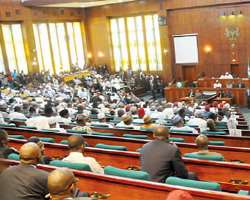House Rejects Removal Of Subsidy On Oil

… Says Planned Removal Is Premature, Nigeria Not Ripe For It
ABUJA, December 01, (THEWILL) - The House of Representatives today rejected the planned removal of subsidies on petroleum products by the executive arm of government describing it as ‘premature’.
The rejection was made by the House when it adopted the report and recommendations of the Hon. John Enoh led joint committee on finance, appropriation, legislative budget and research and national planning and economic development, on the 2012 -2015 medium term fiscal framework (MTFF) and Fiscal Strategy Paper (FSP) of the federal government. The 2012-2015 MTFF was laid on the floor of the House on November 2, 2011.
President Goodluck Ebele Jonathan had in a meeting with federal legislators at the Presidential Villa a few weeks tried to persuade them to support the removal of subsidies on petroleum products saying that the federal government could no longer sustain the measure. Analysts say the government doles out more than N1 trillion naira a year to subsidize petroleum products but a huge part of the cash ends up in the pockets of corrupt senior petroleum ministry officials and their conniving oil marketers.
While considering the recommendations of its joint committee today, the House also raised the exchange rate from N153 to N155 to $1 in line with the CBN directive but kicked against the removal of oil subsidy, which was almost unanimously taken. Attempts by Hon. Matthew Omegara (APGA, Imo) to convince his colleagues to step down on the issue fell on deaf ears.
The House stated that “the proposal on fuel subsidy removal as contained in the revised Fiscal Strategy Paper is premature. Sources other than relying on savings from proposed subsidy removal, as part of financing items for expected deficit should be explored.”
The House also directed the Ministry of Finance to provide comprehensive information on the volume of capital projects to be funded through the Public Private Partnership (PPP) to the National Assembly, before the submission of the 2012 appropriation proposal.
It advised that “the public private partnership should be restricted to specialized areas and government should not abandon its social responsibility in the process.”
On the oil benchmark, the House scaled down the benchmark price of crude oil from $75 to $70. According to the House, “the original presented benchmark price of $75, though reasonable, is considering too optimistic. Therefore, given the uncertainties of the global economic recovery and the average market price of $83.50 to date for 2011, it is recommended that the benchmark price be approved at $70 per barrel.”
It also agreed that taking into cognizance the amnesty programme initiated in 2009 as well as interaction with the Department of Petroleum Resources (DPR) and the Nigerian National Petroleum Corporation (NNPC), the daily oil crude production figures of 2.48mbpb, and 2.55 mbpb, and 2.58mbpb for 2012, 2013 and 2014 are recommended.
In accepting the proposal to borrow N794 billion in 2012, the House cautioned that henceforth, the practice of lumping up total public debt is stopped since it does not provide any meaningful information. It advised that in future “the Debt Management Office (DMO) should provide an analysis of the impact of the private sector and measures to reduce the domestic debt.”
It equally directed the Ministry of Finance to in future provide indicative envelopes for the various sectors, as part of the main report, to enable the National Assembly assess the level of alignment with top line investment priority areas as indicated in the first National Implementation Plan (NIP).
